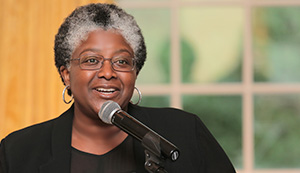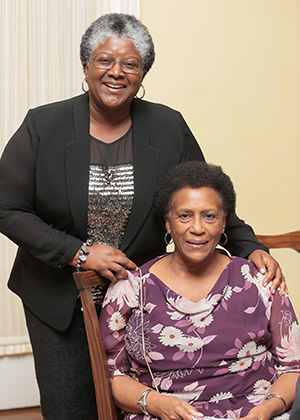Francis brings compassion, humor to patient care

Whatever each day brings, no matter how she feels at any given moment, Deneise Francis, RN, BSN, OCN, CCRP, always brings a smile and a sense of humor to the patients under her care.
Compelled by compassion and an awareness that “my problems are nothing compared to theirs,” she strives to be fully present with her patients. This comes easily for Francis, who is by nature a “people person.” But there was a time when she didn’t know if she could handle the burden of cancer care.
Francis was one of two recipients of the 2014 Sandra Turner Excellence in Clinical Research Award, presented by Hoosier Cancer Research Network in June.
The award was established in 2002 by William B. Fisher, MD, through the George and Sarah Jane Fisher Fund to honor the memory of Sandra Turner, the first executive director of Hoosier Cancer Research Network. Each year, the organization selects individuals for the award who exemplify the qualities Turner possessed and respected in others, such as sustained professional commitment, contribution to the progress of oncology care, and the unflinching touch of compassion.
Francis’s path to oncology nursing took an indirect route. After graduating from the University of Houston with a degree in mechanical technology, she was unable to find work in the field. She eventually landed a job with Xerox and moved to Washington, DC.
About five years later, in 1991, she read an article in Parade Magazine that highlighted the infant mortality rate in Washington, DC, particularly among lower income women who did not receive prenatal care.
“After I read that article, I cried for probably two hours,” Francis recalls.
The next day, she went to her local community college and signed up for prerequisite classes for nursing. Five years later, she earned her associate’s degree, passed her boards, and enrolled at the University of Maryland in Baltimore for her bachelor’s in nursing.
During this time, Francis worked as a nurse at Georgetown University Hospital on an orthopedic, medical-surgical, solid organ transplant unit; but her sights were set on the National Institutes of Health.
“When I finished my BSN, I applied to the NIH and got accepted into their oncology nursing internship program,” Francis said. “It was the best decision of my life.”
 Francis started her work at the NIH in 1998 as a staff nurse on the inpatient unit of the Experimental Transplant and Immunology Branch Oncology Unit, where she administered chemotherapy and infused peripheral blood stem cells to transplant patients.
Francis started her work at the NIH in 1998 as a staff nurse on the inpatient unit of the Experimental Transplant and Immunology Branch Oncology Unit, where she administered chemotherapy and infused peripheral blood stem cells to transplant patients.
[Photo: Deneise Francis and her mother.]
During this time, she was deeply affected by the experiences of her patients. Two patients for whom she cared over a six-year period passed away within the same month, and around that time, her grandfather also died.
Francis was devastated and needed a break from direct patient care.
“I called my mom, and said, ‘I don’t know if I can do this. It’s too much.’ And she said, ‘Yes, people are dying, but look at it this way: For that little space of time, give them all you can and give them the best care you can to make that journey easier.’ When I looked at it that way, I realized I could do this,” Francis recalls.
Francis had transitioned to a new role as a clinic coordinator in the medical oncology outpatient clinic but she missed her patients, and a year later she returned to administering infusions at the day hospital.
In 2006, Francis moved to Florida to be closer to family and to help provide care for her grandmother. She worked as a nurse coordinator at Mt. Sinai Comprehensive Cancer Center in Miami Beach for a year before moving to the Memorial Breast Cancer Center in Hollywood, Fla. At Memorial, she worked as an infusion nurse from 2007 to 2012 and then transitioned to research.
One of the first studies she participated in was HCRN’s BRE09-146, a triple negative breast cancer study. Francis recalls the personal assistance she received from HCRN staff.
“It was one-to-one support, where a lot of CROs don’t offer that kind of support,” she said. “They helped train me in helping them get the best possible data and give the best possible care.”
Francis was surprised to learn she received the $3,000 Sandra Turner award, but she knows exactly where the funding will go: to support her continued education toward a master’s degree. And she wanted to share the award with her co-researcher on the HCRN study.
“Both of us worked on the study together. We were just completely overwhelmed and honored by the award,” she said.
Francis became a SoCRA Certified Clinical Research Professional (CCRP) in August 2014, and soon thereafter moved back to Maryland and to the NIH where she is now working as a research nurse with the Genitourinary Malignancy Branch on the bladder cancer team.
Francis is excited to be part of the progress she has seen in cancer research in recent years. “We’ve gone from where chemotherapy was the ‘be-all and end-all’ to the point where with some diseases we can give a pill,” she said. “We’re seeing treatments become more individualized. It’s amazing to be around patients where we can bring this hope, and for those who don’t yet have this hope, we try to make it easier for them.”
Hoosier Cancer Research Network (formerly known as Hoosier Oncology Group) conducts innovative cancer research in collaboration with academic and community physicians and scientists across the United States. The organization provides comprehensive clinical trial management and support, from conception through publication. Created in 1984 as a program of the Walther Cancer Institute, Hoosier Cancer Research Network became an independent nonprofit clinical research organization in 2007. Since its founding, Hoosier Cancer Research Network has initiated more than 150 trials in a variety of cancer types and supportive care, resulting in more than 300 publications. More than 4,400 patients have participated in Hoosier Cancer Research Network clinical trials.

Facebook
Hoosier Cancer Research Network on Facebook
Linked In
You Tube
Twitter